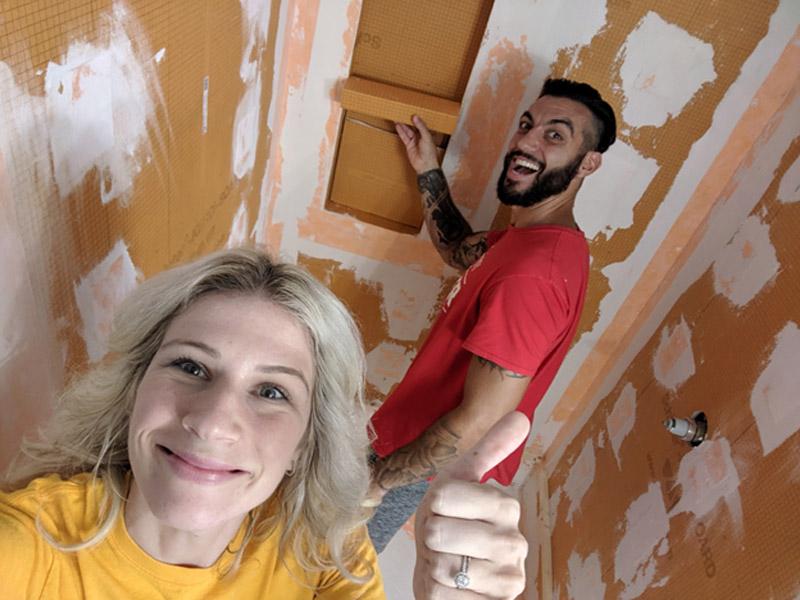
You can’t post most photos of couples in the shower together on respectable websites. Unless, of course, they’re renovating an investment property.
Nathaniel and Brittany Hovsepian are 35 and 27 years old respectively, and own seven rental properties in the Central Savannah River Area straddling Georgia and South Carolina. They’re as “mom and pop” as it comes in real estate investing, and their journey is one that anyone can walk.
Their goal? To build passive income and reach financial independence with real estate, and fast.
“I’m finally a full-time real estate investor, although Brittany still works a full-time job as a mechanical engineer,” Nathaniel explained in our interview. But at the speed the Hovsepians are moving, it won’t be long before working becomes optional for both of them.
Not that they started out with a silver spoon, or that they haven’t made any mistakes. In fact, they fell into rental investing by accident.
Here’s how the Hovsepians collected seven rental properties in one year, how Nathaniel quit his job, what went wrong along the way, and how you can follow in their footsteps.
Accidental Landlords: Nathaniel & Brittany’s First Property
“Our first investment property was actually a total accident. We originally bought it as a home for us to live in, in a town about 20 minutes east of Oklahoma City.
“Then Brittany ended up getting a really good job that would have been an hour and a half drive from the home, so we moved out. But instead of selling it, we converted the home into a rental.”
And why not? The Hovsepians mostly paid cash for it, and it was in a relatively high-demand neighborhood, so it made a perfect first foray into landlording. “We bought it for $98,000 using mostly cash. If I can recall, we borrowed a $20,000 loan.
“Because it was almost entirely purchased with cash, it cash-flowed very well. After property taxes, insurance and the small loan, it brought in about $900 per month.”
Granted, it needed some work to be marketable. “It took about $16,000 to get it up to a quality rental status, which we shelled out in cash. I did almost all of the work myself to save money.”
Beyond saving money, that helped them avoid hassling and negotiating with contractors. It also gave them valuable experience, both in home renovation and what to look for when walking through prospective properties.
When they moved to Georgia, they kept it in their portfolio. “We had left renters in it when we moved out of Oklahoma a little over a year ago. But after their lease contract expired, and they decided not to renew the lease, we decided to sell the property so we could accelerate our buying in Augusta.”
Which is where the true story of their real estate investing career begins.
Scaling Their Real Estate Portfolio
“It took a long time for us to scale after buying that initial property. It wasn’t really until we moved out of Oklahoma that I really got focused on making real estate a full time, long lasting gig.”
But once Nathaniel and Brittany got serious about investing in real estate, they hit the ground running. “We bought all of our current seven rental properties within the last year. We were fortunate enough to have a lot of working capital to start with after we moved, as I’ve been a saver for a while now. And we have gotten some good deals that we were able to pull a lot of capital back out of and roll it into the next property.”
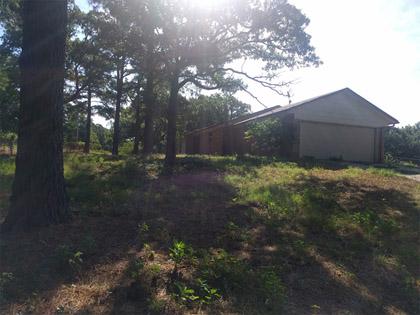
“Our first rental house (the accidental rental)”
I asked Nathaniel how he’s gone about finding deals on investment properties. His answer surprised me.
“We have scaled due to our PPC (online pay-per-click) advertising that we’ve done through our company, The Expert Home Buyers. That’s allowed us to find more off-market deals from motivated sellers. The phone is ringing a lot more now that we have started advertising and scaling up. We are getting a lot more leads these days, and answering a lot of calls about selling properties that we have.”
Keeping the Cash Moving
Because, as it turns out, Nathaniel and Brittany aren’t keeping every home they buy as a rental. “Some of the properties we’ve held for ourselves as rental properties, and others we sell to other investors.”
So, I asked for clarification, you’re flipping some of the homes?
“No, not flipping. Currently we are wholesaling or wholetailing properties, to raise additional capital for investing.”
Both of which are terms worth pausing to define. Wholesaling refers to putting a contract on a property, then selling the rights to that contract to another investor, for a margin. For example, you put the property under contract for $50,000, and immediately sell the contract to another investor for $55,000, earning you a $5,000 profit without ever having to get financing or take title to the property.
Wholetailing, on the other hand, refers to actually taking title to the property, but immediately listing and selling the property as-is, with little or no renovations or repairs.
(article continues below)
Free Masterclass: How to Reach Financial Independence in Under 5 Years
The Kind of Properties They’re Buying
“We tend to buy around the $65,000 purchase point for our investment properties. We’ve found that to be our sweet spot. For our buy-and-hold real estate, we are looking for almost move-in ready homes that need very little rehab. Things like paint and touch-up repair work – cosmetic updates.”
Which keeps their renovations quick and cheap, and minimizes their rental maintenance headaches. I asked what they collect in rent, at that price point in the Central Savannah River Area. “We can charge about $800 to $900 rent per month. This will usually push us over $200 per month net rental cash flow after setting aside money for expenses. We average $212 per house per month.”
Which are pretty attractive returns, given the price point. But the cash flow conversation raises another question in turn: how are the Hovsepians funding their deals?
Financing Their Rental Properties
“We usually purchase using cash, and then refinance for a long-term rental property loan once we have solid renters in place.”
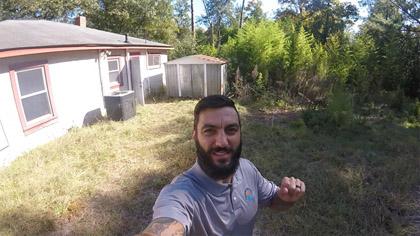
“Our first rental property in South Carolina”
In other words, they loosely follow the BRRRR method of real estate investing. Except they make minimal renovations, and buy up-front with cash. That saves them thousands of dollars in initial closing costs and carrying costs on a hard money loan.
And it’s made possible because they raise capital by wholesaling and wholetailing some properties, not just buying.
Still, their total cash investment in each property remains low. After refinancing they only have around 20% of their own cash in each rental.
“We are currently right around $1,400 per month in total net rental cash flow. All of that is being dumped back into the business for marketing and new acquisitions.”
New acquisitions which earn them more money, whether wholesaled or kept as a cash-flowing rental property.
Read about rental property calculator.
Read about lowest down payment for investment property.
“Sometimes the Best Lessons Are Learned Through Defeat”
One question I always love to ask real estate investors is what hasn’t gone according to plan. Real estate investing isn’t all rainbows and butterflies, after all.
“We purchased one home early on that needed a lot more work than we had assumed. It ended up needing to be completely reframed due to major termite damage. I should have gotten another pair of eyes on the house before moving forward with the deal. If I had gotten someone who had more experience looking at houses like that one, we may have been able to go back and renegotiate a better price for the home – or skip it entirely.
“In the end we just swallowed the bitter pill and sold the home for a slight loss. We decided that it was better to take a loss now and clear up the working capital, rather than sink a bunch of money into it and cross our fingers that we would turn a profit six-to-nine months down the line.
“Fortunately, it only lasted a day or so until I was able to mentally recover and realize that this is a long journey that we are going on, and that taking a few thousand dollar loss now is only going to be felt in the very near term.
“Sometimes the best lessons are learned through defeat.”
It’s not a mistake they’ve made since. When in doubt, they now call on more experienced investors for their input.
I then asked about other speed bumps they’ve stumbled over along the way:
“We purchased a house early on that looked good on the surface as a flip. But once we started doing demolition work we realized that we were in over our heads as far as the rehab goes. We had bitten off more than we could chew.
“Originally, we had gotten the opinion of another investor who recommended that we wholesale it, but we thought it was best for our future as real estate investors to try and do the rehab ourselves. Lesson learned: lean on the experience of other more seasoned investors. Knowing what you are getting into is a necessity!”
(article continues below)
Nathaniel & Brittany’s Advice for New Investors
“For someone who is looking to buy their first rental property, it is a great idea to have someone that you can call or text to ask questions. I have been very fortunate to meet some really seasoned investors through real estate investing club meetings that have been willing to come walk houses with me and give me advice.
“I have found that most of the investors that you meet are more than willing to share their time and experiences with you. They had people help them along the way, and are now trying to pay it forward. I look forward to being able to do the same.”
Just Get Started
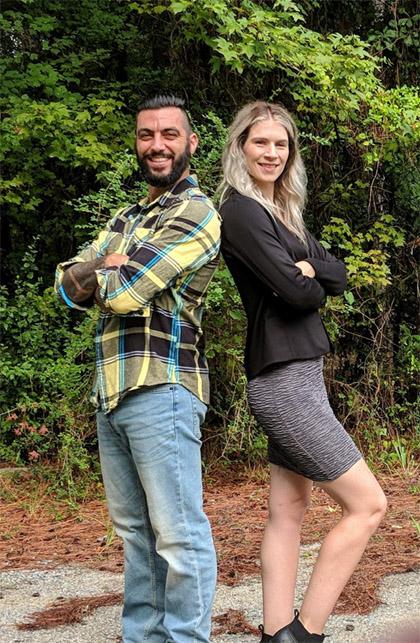
“Brittany and I trying to look professional”
“I wish I had known that you don’t need to know everything when you are first getting started. The most important thing that you can do when starting out is to look for and analyze deals. Learn how to find good deals, get comfortable with a rental property cash flow calculator and forecasting expenses.
“I thought that I needed to know how I was going to finance the deal, how I was going to close the deal, and everything in between, when in reality, that stuff just falls into place (with effort) once you have actually found a good deal.
“If you are serious about real estate investing, then get out there and start looking at houses and making contacts with other people that are doing deals. There are so many houses to be purchased out there, you just have to want to find them.”
Get Serious About Tenant Screening
“We have learned that in order to maximize rental income, you need to find tenants to stay in your house and not want to move every year.
“The best way to do this is to screen tenants for that specific outcome in mind. Find out why they want to move, and see if they want to put down roots in your house and neighborhood.”
It’s a point Deni and I return to over and over again: turnovers are the hidden killers of rental cash flow. Not only because vacancies mean no income. It’s during turnovers when you get hit with maintenance costs, especially in repainting the entire unit and often replacing the carpets or other flooring.
Plus turnovers also create the overwhelming majority of the work involved in being a landlord.
Beyond scrutinizing rental applications and tenant screening reports, get a sense for whether the applicant will stick around for the long term. How often have they moved in the last ten years? How often have they changed jobs? And simply ask them outright: How long are you looking to be in this neighborhood?
Final Thoughts
“Our second tenant ever asked us if he could keep goats on the property so he didn’t have to mow the lawn. After doing a little research we told him that it would be fine, and they sure did keep the grass down.”
Being a landlord is a good gig – most of the time. As you buy your first few rental properties, or scale your real estate portfolio, take a page out Nathaniel and Brittany’s book. Get guidance from coaches, mentors, and other more experienced investors. Don’t overextend yourself, either in renovation projects or stretching your cash too thin. Screen tenants thoroughly and aggressively.
But most of all, just get started. You don’t need every little detail mapped in perfect clarity. Focus on the fundamentals of finding good deals and accurately forecasting rental cash flow, and the rest, such as financing and rental property loans, will fall into place.
Read llc mortgage loan requirements.
Read does california have rent control?
What are you doing to scale your rental portfolio? What lessons have you learned along the way? Share your thoughts below!
More Unconventional Reads:
About the Author

G. Brian Davis is a landlord, real estate investor, and co-founder of SparkRental. His mission: to help 5,000 people reach financial independence by replacing their 9-5 jobs with rental income. If you want to be one of them, join Brian, Deni, and guest Scott Hoefler for a free masterclass on how Scott ditched his day job in under five years.

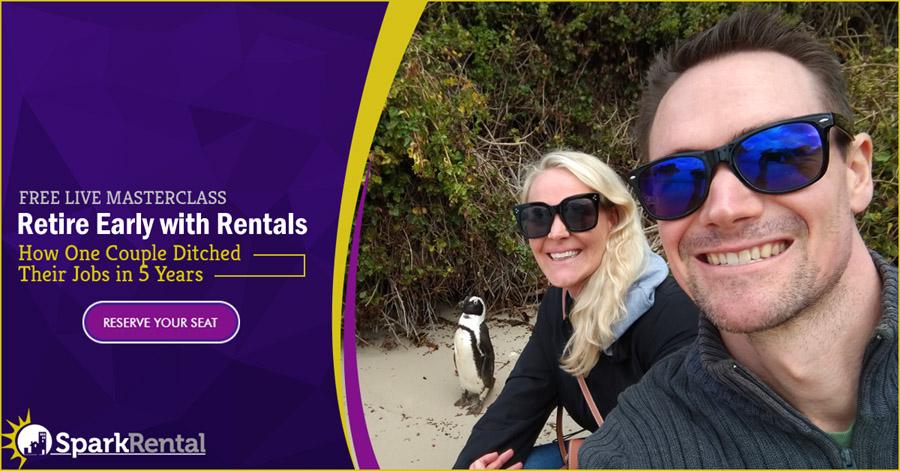

























I talked with my girlfriend about this thought we was gonna try it
Keep us posted Cody, and let us know how we can help!
Awesome case study! We’re working to snowball our own rental income, and we’re about to pass $1,000/month net cash flow with our next property.
Going to make it that much easier to buy the next one, with each property we buy!
Thanks Kate, and so glad to hear you’re quickly building passive rental income yourselves!